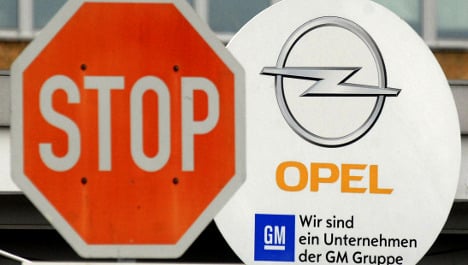In a preliminary deal announced in Berlin with great fanfare on September 10, GM is selling a 55 percent stake to Canadian auto parts-maker Magna and Russian state-owned lender Sberbank.
Chancellor Angela Merkel’s government, keen to safeguard the jobs of Opel’s 25,000 German employees, half the total in Europe, agreed to sweeten the deal with €4.5 billion worth of public money.
Merkel was eager to secure a rescue before elections on September 27. She duly won a second term.
The financing was contingent, however, on other European governments where Opel has plants, such as Britain, Spain, Poland and Belgium, stepping up to the plate and providing their own taxpayers’ money too.
Instead, the deal has been met with grumbling, with these countries unwilling to stump up cash for a deal that they see as only guaranteeing German jobs and keeping German plants up and running.
With Opel losing money fast, dependent on a market where too many cars are being made for too few customers, Magna is reported to be looking to take around 10,500 workers off the payroll.
British Prime Minister Gordon Brown’s government, which has a far tougher re-election battle than Merkel waiting for it next year, has made clear that it is not amused.
Peter Mandelson, British business secretary, told the Financial Times in Seoul last Thursday he could not “sign off” on the deal in its current form, citing “shortcomings” identified in an independent auditors’ report.
Britain, where Vauxhall employs 4,700 people, is ready to provide €400 million in loan guarantees, but first wants assurances that two plants in Luton and Ellesmere Port remain open, the FT said.
Spain, where Opel employs 7,000 people in Zaragoza province, has also been up in arms, with Industry Minister Miguel Sebastian boycotting a European meeting on Opel in Berlin on Friday.
“We have never been favourable to Magna’s offer,” a spokesman in Madrid said on Friday, with Sebastian “pretty unhappy” after the last get-together in the German capital.
Instead, Sebastian met with Magna boss Siegfried Wolf, appearing afterwards slightly more conciliatory, pledging to improve “communication problems” with the Canadian firm.
In Belgium, where Opel’s Antwerp plant is seen as a prime target for closure, thousands of workers, including hundreds from Germany, held a mass protest last month. The plant employs around 2,500 workers.
These countries have turned to EU headquarters in Brussels for help. EU Competition Commissioner Neelie Kroes is scrutinising the deal to determine whether Germany’s state aid was contingent on German plants not being closed, which would make it illegal.
Germany, though, has expressed confidence that all will be well, and GM, Magna and Berlin reportedly want to sign a final deal this week. The transaction would then be completed by the end of November.
But analyst Tim Urquhart from IHS Global Insight said this aim was ambitious as long as there was no thumbs-up from the EU and no deal with unions on employees taking a 10-percent stake in “New Opel”.
“I have said right from the start that there are still a lot of twists and turns to be done before this deal is completely signed off,” Urquhart said.



 Please whitelist us to continue reading.
Please whitelist us to continue reading.
Member comments